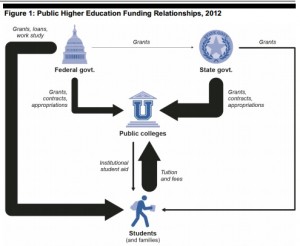GAO Study on State Funding of Public Colleges
In a report for the Senate’s Committee on Health, Education, Labor and Pensions, the Government Accountability Office (GAO) issued a new study examining how state funding and policies have affected college affordability.
Between 2003 and 2012, the report found that state funding across all public colleges decreased by 12 percent, citing the recession’s impact on state budgets as a likely reason. At the same time, median tuition rose 55 percent, and as of fiscal year 2012, became a greater source of revenue for public colleges than state funding.
The GAO provided recommendations in particular about how the federal government could incentivize state action from Federal Student Aid changes, new federal grant programs, and providing consumer information on college affordability.
iNACOL State Policy Framework for Competency-based Education
The International Association for K-12 Online Learning (iNACOL), which advocates and supports quality blended, online and competency-based learning opportunities, has released a five-point state policy framework to support competency-based education.
According to the report, 36 states have adopted policies to enable competency based education such as allowing for proficiency-based diplomas, waiving seat time requirements or creating credit flexibility. As the impetus behind its policy framework, iNACOL predicts that the move toward mastery and competency will only increase moving forward.
To reach sustainable systemic change, iNACOL recommends the following:
- Create competency-based education systems
- Improve student access and equity
- Measure and assure quality from inputs to outcomes
- Support innovative educators
- Support new learning models through connectivity, data systems and security
Nanodegrees and Stackable Credentials
On Tuesday, the Center for American Progress convened a discussion about reimagining the path to the workforce through nanodegrees and stackable credentials. The panel featured Eugene Giovannini of Maricopa Corporate College, Clarissa Shen of Udacity, and Anne Wintroub of AT&T. The event also focused on the think tank’s 2013 report, “A Path Forward.â€
You can watch the discussion here.
Andrea Zimmermann, State Policy Associate


 Sometimes called “the next disrupter†in education, open badges offer an innovative platform for recognizing and displaying a students’ competency demonstrated either inside or outside the traditional classroom. Yet questions remain about how badges work at the institution and state level, how they can be folded into existing education systems, and what it takes to ensure their quality, reliability and validity.
Sometimes called “the next disrupter†in education, open badges offer an innovative platform for recognizing and displaying a students’ competency demonstrated either inside or outside the traditional classroom. Yet questions remain about how badges work at the institution and state level, how they can be folded into existing education systems, and what it takes to ensure their quality, reliability and validity.